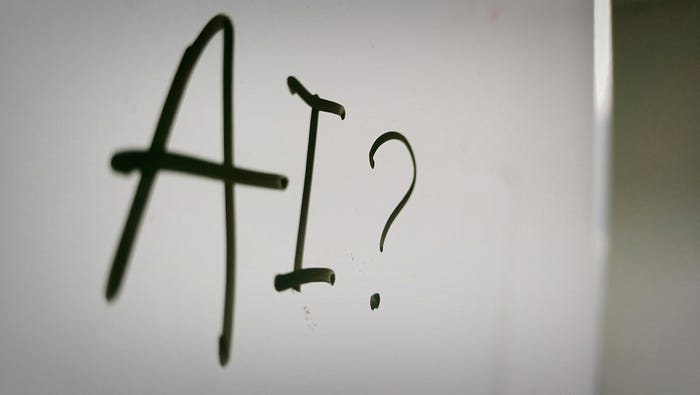There's always a moment in a con when you realize your wallet's been ransacked.
For some, it's when the product arrives and it looks like it was made by an underpaid, drunk octopus with access to Temu glue. For others, it's when they go looking for a refund and find the company has disappeared; the website returns a 404, and the "founder" is onstage somewhere talking about how his failure became innovation.
We're approaching that moment now, en masse, with artificial intelligence.
The bubble is inflating faster than a tech bro's ego at a Las Vegas free-coke-and-escorts conference. And you, yes, you, are being told it's not a bubble at all. That this time it's different. That AI is inevitable, transformative, divine, even.
But let me put it plainly, AI is a bubble.
A beautifully polished, algorithmically enhanced swindle, and if you're not one of the chosen few on the inside, then congratulations, you're the exit strategy.
The game is ancient. Raise the pitch, sell the dream, and leg it before the floor gives way.
Except now it's not Bulgarian beach condos or Beanie Babies. It's synthetic consciousness, baby. Or rather, the suggestion of it. A chatbot that mimics understanding with all the grace of a parrot on mescaline, and the valuation of a Roman emperor's ransom.
Timnit Gebru, former co-lead of Google's AI ethics team, until she dared to say "maybe we shouldn't build racist robots," described the current AI hype as a "gold rush," warning that "a lot of the people who are making money are not the people actually in the midst of it," and emphasized that "we need regulation and we need something better than just a profit motive."
Silicon Valley has become a chapel of narrative alchemists, hawking salvation by code. Venture capitalists spewing promises of artificial godhood, while simultaneously planning which Caribbean island they'll retreat to once the whole edifice turns to ash.

This ain't our first hallucination
Let's not pretend this is anything new. The AI bubble is just the latest flavor of techno prophecy. Every generation has its scam. The only thing that changes is the font and the haircuts.
Remember the dot-com boom? Back in the halcyon late 1990s, if your company name had a ".com" at the end, investors would throw cash at you like you'd just cured consumption.
Pets.com spent $11.8 million on a Super Bowl ad for a business model that made less sense than a horse on a surfboard. When it all crashed, it wiped out trillions and turned Wall Street into a wailing ward.
Fast forward to 2012, and 3D printing was going to change the world.
We'd all have little replicators on our desks, churning out bespoke forks and prosthetic limbs. For about eighteen months, it was the stuff of techno utopia. Then it turned out no one really wanted to print their own sandals. Stocks tanked. The printers gathered dust. The narrative evaporated.
And then, the Holy Trinity of modern nonsense, crypto, non-fungible tokens (NFTs), and Special Purpose Acquisition Companies (SPACs).
Crypto was going to free the world. A currency for the people, by the people. Unless the people lived in sub-Saharan Africa or had a dial-up modem.
Then came the JPEG Renaissance, NFTs, or as I like to call them, "receipts for things you don't own." Beeple sold a collage for $69 million, and the rest of the internet lost its already fragile mind.
And let us not forget the SPACs, where you give me money now, and I'll think of something to do with it later. Some of the biggest names in finance backed these blank-check abominations. Most of them are now trading like expired milk.
As technology journalist and author Cory Doctorow has observed, Big Tech isn't losing its mind, it's doing exactly what its investors expect, first servicing users, then prioritizing business partners, and finally squeezing out every drop of shareholder value in a repeated, extractive performance.
And what investors want is simple, exit liquidity. Which, dear reader, is just a posh way of saying you.
AI isn't intelligent, it's plausible
Now here we are, drunk on the algorithmic Kool-Aid, believing that Large Language Models are going to write poetry, cure disease, and drive us to Tesco.
Let me break this gently, AI isn't smart. It's a confidence trick with predictive text.
Emily Bender, professor and director of Computational Linguistics Laboratory at the University of Washington, calls them "stochastic parrots," which is academic for "they sound clever but don't know feck all."
These models don't understand language. They reproduce it. Like a tape recorder spliced with a tabloid.
Ask one of them a question, and it'll answer with the soothing cadence of competence, but no comprehension beneath. It's like asking a sleep-talking philosophy student to explain Immanuel Kant. The words are there, the meaning is not.
American psychologist and cognitive scientist, Gary Marcus, who's made a career out of being the designated wet blanket at AI conferences, is blunt, "We've moved too quickly from hype to deployment." Translated, you're all deploying nonsense at scale and wondering why it spits out garbage.
AI doesn't understand truth. It doesn't understand facts. It doesn't actually understand anything. It just strings together probable phrases like a best man after 12 pints of Guinness giving a wedding toast for a couple he met this morning at the registry office, who were desperate for a witness.
And yet, this hollow marvel is now being slathered over every industry like sacred oil. Customer service, healthcare, education, therapy, journalism. Not because it works, but because it's cheap. And scalable. And sounds impressive in investor calls.
You're not buying in, you're being bought out
Now we arrive at the rancid core.
You are not witnessing a revolution. You are participating in someone else's exit plan.
See, this is how it goes. First, the insiders pump the hype. They tell tales of machine gods, of exponential returns, of a future so shiny you'll need ocular implants. They inflate the valuations with venture capital cash, ink deals with confused megacorps, and sprinkle every press release with "AI-powered" like it's fairy dust.
Then the IPOs begin. The mergers. The acquisitions. The decks are shuffled. The nerds who call themselves founders cash out. And you, poor clown that you are, you're left holding stock in a company whose flagship product just told someone to microwave their cat.
American writer and columnist, Douglas Rushkoff, said it years ago, "It's as if they want to build a car that goes fast enough to escape from its own exhaust." That's AI in a nutshell. Build the bubble. Inflate the hope. Flee the wreckage.
Meanwhile, American computer scientist Eliezer Yudkowsky, high priest of machine doomerism, is out here publishing screeds about how AI might destroy humanity, while collecting fees from the very machine he fears. Even the doomsayers are grifting.
When it bursts, remember who told you it was divine
This bubble will pop.
Not because AI isn't powerful, but because the people selling it don't care what it does, only what it can be sold as.
President of the Signal Foundation, an American non-profit organization aimed at "protecting free expression and enabling secure global communication through open source privacy technology, " Meredith Whittaker put it plainly, AI was "born out of the surveillance business model."
What they're building isn't intelligence. It's a mirror, a mimic, a control system. One designed to monitor, monetize, and manipulate. And the biggest illusion of all is that it's benevolent.
Before you invest your time, your savings, and your hopes, look closely. Strip away the rhetoric. Ask who benefits. Ask who exits with the large sacks of cash.
Don't be the sucker at the altar of artificial salvation.
I'm Paddy Murphy — a counselor, teacher, and writer with over twenty years of experience helping people face the world without losing their soul. If this piece stirred something in you — if you're tired of being told to switch off your feelings in order to keep up — I can help you reconnect with what matters. Not as a guru. Not as a brand. Just as someone who believes empathy is still worth fighting for.
If you want to talk things through, I offer a free 30-minute discovery call. If you want more of this kind of writing — psychology, mental health, technology, philosophy, and the occasional digital heresy — you can sign up for my newsletter. You can also follow me on Medium or support the work directly via PayPal. My different social media channels are here.


